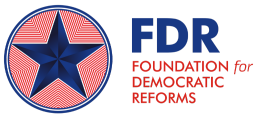WHY focus on Electoral and Political Reforms?
The Indian electoral and political system is afflicted by several distortions ranging from illegitimate money-power in elections, widespread vote-buying, religious and caste polarization, criminalisation of politics and frequent defections. These challenges, making our democracy illusory, require immediate course correction. Having created a political and governance system with endemic corruption and criminalisation- sans accountability and delivery, what is required is not a mere change in players but a change in the rules of the game.
Our First-Past-the-Post (FPTP) system forms a winner-take-all condition where the candidate has to secure one vote more than his/her competitor to be victorious. In a high-risk, high-reward system, securing the marginal vote becomes critical. Additionally, drawing our executive from an elected legislature in a winner-take-all system ensures dependency on its support for its day to day survival.
HOW can we reform?
Proportional Representation
Proportional Representation (PR) is an electoral system in which seats are allotted to political parties on the basis of the number of votes polled for them. Under PR, the dependence is on overall vote-share allowing state-wide contest in elections, rather than on marginal vote share in a smaller territorial constituency. A larger territorial unit and the promise of representation based on vote-share not only eliminates the incentive for vote-buying, but forces change by giving representation to small parties, scattered minorities and legitimate reform groups.
It promotes genuine competition among political groups and ideas, divorced from local clout and money power. In addition, PR enhances the internal democracy of political parties as autocratic and strong-armed leadership is compelled to accommodate diverse interests to enhance their vote-share.
Political Party Reform
Political parties are unlike other private organizations by virtue of their avowed pursuit of power and control of levers of the state. Therefore, they must conform to basic norms of democracy through fair regulation, ensuring internal democracy and welcoming public scrutiny. The regulation must provide for the following:
- Leadership and selection of candidates chosen periodically by secret ballot, preventing nomination and excessive control by central leadership
- Transparency in party funding, including full disclosure of significant contributions
Direct Elections at the State-level
Strict separation of the executive and legislature at the State-level, with direct election of the Chief Minister would enable better policy-making and administration, halting the dangerous cycle of money-power, corruption, and governmental survival. Cabinet can be drawn from outside the legislature and the executive will be free from vested interests as there is no scope for interference by MLAs. Local governments can be strengthened and illegitimate expenditure on elections reduced as voters begin to discern the link between vote and public good. Furthermore, the appeal of the MLA office will fade as those candidates with merit and ambition will compete for executive positions in the local governments and those with policy-making interest contest legislative elections.
WHAT has FDR done so far?
FDR has consistently advocated for electoral reforms for several decades now. Following are some of our major interventions:
The Election Watch Program, 1998 onwards:
Starting as a ‘know your electoral candidate’ initiative, it evolved into a campaign to engage citizens in preventing polling irregularities. It included screening candidates for criminal records and moderated debates with constituents, and was adopted in various states and by electronic media.
Verification of Electoral Rolls, 1999 onwards:
Lok Satta conducted pilot studies (1999-2002) to verify the authenticity of electoral rolls, leading to the Election Commission simplifying citizen-friendly procedures for accessing, verifying, and updating electoral rolls. A survey conducted in 2004 showed a dramatic decline in flaws in electoral rolls.
Candidate Disclosure Law, 1999-2003:
Lok Satta’s sustained Election Watch campaign led to the Supreme Court upholding its and its co-petitioners’ (Association for Democratic Reforms and PUCL) contention that all candidates for legislative offices in India should file a sworn statement disclosing their criminal and financial antecedents at the time of their nomination.
Alternative Bill for Women's Reservation, 2000:
Lok Satta, along with partner organisations, proposed an alternative solution for women’s representation in Parliament, involving the nomination of women candidates in each party. This proposal gained wide acceptance, with the Election Commission endorsing it as a model for enhancing women’s representation in legislatures.
Political Funding Reforms, 2003:
Lok Satta effectively and quietly lobbied with the government and major political parties for political funding reform providing for disclosure, tax incentives and free broadcast time in media. A progressive law to this effect was enacted in September 2003, with multi-partisan support in the Parliament.
VOTEINDIA - National Campaign for Political Reforms (NCPR), 2004:
This campaign aimed to stimulate public debate, increase awareness regarding the political and governance crisis and mobilise public opinion in support of electoral system reform, internal democracy in political parties, and direct elections in States. The campaign was launched in major cities and states, including Hyderanad, Chennai, Bangalore, Ahmedabad and Mumbai.
Election Watch 2004 (APEW 2004):
Lok Satta’s campaign for assembly and parliamentary elections in Andhra Pradesh to reverse criminalisation and prevent political candidates from fielding candidates with a criminal record. Widespread media coverage and public outcry compelled the parties to not field about half the candidates figuring in Lok Satta’s list.

